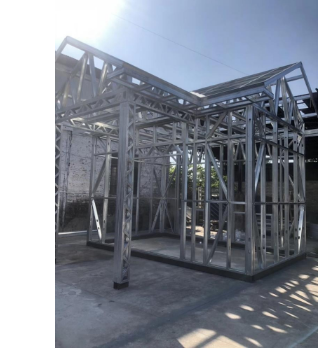First, the necessity and urgency of reform
The Party Central Committee and the State Council attached great importance to standardization work. In 2001, the National Standardization Management Committee was established to strengthen the unified management of standardization work. With the joint efforts of various departments and localities, China's standardization industry has developed rapidly. Up to now, the total number of national standards, industry standards and local standards has reached 100,000, and the standard system covering all fields of the first, second and third industries and social undertakings has basically taken shape. China has successively become an international standardization organization (ISO), a permanent member of the International Electrotechnical Commission (IEC) and a member of the International Telecommunication Union (ITU). Our experts are responsible for a series of important positions such as ISO Chairman, IEC Vice Chairman, and ITU Secretary General. The number of international standards has increased year by year. Standardization plays an increasingly important role in ensuring product quality and safety, promoting industrial transformation and upgrading, improving economy and efficiency, and serving foreign trade. However, judging from the growing demand for China's economic and social development, the current standard system and standardized management system can no longer meet the needs of the development of the socialist market economy, and even affect economic and social development to a certain extent.
First, the standard lacks aging and lags, and it is difficult to meet the needs of economic upgrading and efficiency upgrading. Modern agricultural and service industry standards are still few, and social management and public service standards have just started. Even in the relatively complete industry, the lack of standards exists to varying degrees. In particular, the current demand for standards for energy conservation and consumption reduction, new urbanization, integration of information and industrialization, e-commerce, trade and logistics, etc. is very strong, but there is still a large gap in standard supply. China's national standard-setting cycle averages 3 years, far behind the needs of rapid industrial development. The standard update rate is slow, and the “age age†is more than 1 times higher than that of developed countries such as Germany, the United States, Britain and Japan. The overall level of standards is not high, and it is difficult to support economic transformation and upgrading. China's leading international standards only account for 0.5% of the total number of international standards, and the "China Standard" is not highly recognized internationally.
Second, the standard cross-repetition contradiction is not conducive to the establishment of a unified market system. Standards are the basis for production and operation activities, are important market rules, and must enhance unity and authority. At present, there are nearly 2,000 current national standards, industry standards, and local standards with the same name. Some standard technical indicators are inconsistent or even conflicting, which not only causes difficulties in implementing standards, but also causes waste of resources and standards of law enforcement by government departments. one. In particular, mandatory standards involve health, safety and environmental protection, but there are many entities in development. 28 departments and 31 provinces (autonomous regions and municipalities) have formulated mandatory industry standards and local standards; a large number of mandatory national, industry and local standards. More than 10,000 items, lack of strong organizational coordination, cross-repetition contradictions are difficult to avoid.
Third, the standard system is not reasonable enough to meet the requirements of the development of the socialist market economy. National standards, industry standards, and local standards are all developed by the government, and 70% are general product and service standards. Many of these standards should be formulated by market entities in accordance with market rules. The internationally accepted group standards have no legal status in China, and the standards that the market independently formulates and quickly reflects the demand cannot be effectively supplied. Even if the enterprise standards are formulated and used internally by the company, it must go to the government department to perform the filing and even the review and filing, and the enterprise's initiative is suppressed, lacking innovation and competitiveness.
Fourth, the standardization and coordination promotion mechanism is imperfect, which restricts the improvement of standardization management efficiency. The standards reflect the common interests of all parties, and various standards need to be connected. Many standard technologies are extensive and the industry chain is long. In particular, some standards involve many departments, and the relevant parties have inconsistent positions. The coordination is difficult. Due to the lack of authoritative and efficient standardization and coordination mechanism, the more important the standards are, the more difficult it is to produce. Some standard implementation effects are not obvious, and relevant supporting policies and measures are not in place, and the work pattern of multi-sector collaborative promotion of standards implementation has not yet been formed.
The root cause of these problems is that the current standard system and the standardized management system were established in the 1980s. The role of the government and the market is misplaced, and the vitality of the market entities has not been fully utilized, which has hindered the effective development of standardization and affected standardization. To play its role, we must effectively transform the government's standardization management functions and deepen the reform of standardization work.
Second, the overall requirements of the reform
The reform of standardization work should focus on making the market play a decisive role in resource allocation and better play the role of the government, focusing on solving the problem of imperfect standard system, unsatisfactory management system, unsuitable development of socialist market economy, reform of standard system and standardization. The management system, improve the standard-setting work mechanism, strengthen the implementation and supervision of standards, and give full play to the basic and strategic role of standardization in promoting the modernization of the national governance system and governance capacity, and promote sustained and healthy economic development and overall social progress.
The basic principles of reform: First, adhere to the principle of decentralization and decentralization. Put the release in place, foster the development of corporate standards, liberalize the enterprise standards, and stimulate the vitality of the market; manage the management of the management, strengthen the mandatory standard management, and ensure the basic supply of public welfare standards. The second is to adhere to international standards and suit the national conditions. Drawing on the advanced experience and practices of standardized management in developed countries, combined with the actual development of China, we will establish and improve the standard system and standardized management system with Chinese characteristics. The third is to insist on unified management and division of labor. It not only plays a good role in the comprehensive coordination of the State Council's standardization authorities, but also gives full play to the role of the various departments of the State Council in the formulation, implementation and supervision of standards in relevant fields. The fourth is to adhere to the administration according to law and promote overall planning. Accelerate the construction of the standardization of the rule of law, do a good job of the organic integration of major reforms of standardization and the revision and improvement of standardization laws and regulations; rationally coordinate the priority areas, key links and implementation steps of reform, and promote the stock reform of the current standards through the independent increment of market standards.
The overall goal of the reform: to establish a new standard system that is coordinated by the government-developed standards and the standards independently developed by the market, to coordinate and standardize the new standard system, to improve the standardization management system of unified coordination, efficient operation, government and market governance, and to form a government-led, market-driven The standardization work pattern of social participation and coordinated promotion effectively supports the construction of a unified market system, making the standard a “hard constraint†on quality and promoting the Chinese economy to the mid-to-high end level.
Third, reform measures
Through reforms, the current standard system of government single supply is transformed into a new standard system composed of standards set by the government and standards independently established by the market. The standards set by the government are reduced from 6 categories to 4 categories, which are mandatory national standards and recommended national standards, recommended industry standards, and recommended local standards. The standards independently formulated by the market are divided into group standards and enterprise standards. The government-led standards focus on the basics of protection, and the standards set by the market are focused on improving competitiveness. At the same time, establish a standardized management system that is compatible with the new standard system.
(1) Establish an efficient and authoritative standardization and coordination mechanism. Establish a standardization and coordination promotion mechanism of the State Council composed of leading comrades of the State Council and responsible comrades of relevant departments, coordinate major reforms of standardization, study major policies for standardization, and coordinate the formulation and implementation of cross-sectoral cross-disciplinary and major dispute standards. The daily work of the State Council's standardization and coordination promotion mechanism shall be undertaken by the competent department of standardization under the State Council.
(2) Integrating streamlined mandatory standards. On the standard system, the existing mandatory national standards, industry standards and local standards are gradually integrated into mandatory national standards. In the scope of the standard, the mandatory national standards are strictly limited to the scope of ensuring personal health and life and property safety, national security, ecological environment safety and meeting the basic requirements of social and economic management. In terms of standard management, the relevant departments of the State Council are responsible for submitting, organizing drafting, soliciting opinions, technical review, organizing implementation and supervision of mandatory national standards projects; the competent department of standardization under the State Council is responsible for the unified project and numbering of mandatory national standards, and in accordance with world trade. Organize rules to conduct external notifications; mandatory national standards are approved by the State Council for publication or authorization. Strengthen supervision and inspection and administrative law enforcement in accordance with mandatory national standards. Free mandatory national standard texts are published to the public. Establish a statistical analysis and reporting system for the implementation of mandatory national standards.
Where laws and regulations provide otherwise for the formulation of standards, they shall be implemented in accordance with current laws and regulations. Environmental protection, engineering construction, mandatory national standards for medical and health, compulsory industry standards and mandatory local standards are managed according to the existing model. Safety production, public security, and tax standards are temporarily managed according to the existing model. Nuclear, aerospace and other industry standards in the military industry involving national security and secrets shall be managed by the competent department of national defense science and technology industry under the State Council.
(3) Optimize and improve the recommended standards. On the standard system, further optimize the recommended national standards, industry standards, and local standard system structures, promote the transition to public welfare standards within the government's scope of responsibility, and gradually reduce the number and scale of existing recommended standards. In the scope of standards, the scope of formulation of recommended standards at all levels and in various fields is reasonably defined. The recommended national standards focus on the formulation of basic and mandatory standards for mandatory national standards. The recommended industry standards focus on the development of important products in the industry. Engineering technology, service and industry management standards; recommended local standards can be formulated to meet local natural conditions, ethnic customs and other special technical requirements. In terms of standard management, the competent department of standardization of the State Council, the relevant departments of the State Council, and the local government standardization departments are responsible for coordinating the management of recommended national standards, industry standards, and local standards. Make full use of informatization means, establish a platform for information disclosure and sharing in the whole process of revision and revision, strengthen information sharing, social supervision and self-examination and self-correction in the process of revision and revision, effectively avoiding the recommendation of national standards, industry standards and local standards. The crossovers in the process are repeated. Simplify the revision process, improve the efficiency of approval, and shorten the revision cycle. Promote free disclosure of public welfare recommendations texts to the public. Establish standard implementation information feedback and evaluation mechanism, timely carry out standard review and maintenance update, and effectively solve the problem of lack of standard lag aging. Strengthen the management of the standardization technical committee, improve the broadness and representativeness, and ensure the scientific and fairness of standard setting.
(4) Cultivating development group standards. In the standard-setting body, encourage social organizations and industrial technology alliances such as associations, associations, chambers of commerce, federations, etc. to coordinate relevant market entities to jointly develop standards that meet market and innovation needs, for voluntary selection by the market, and increase the effective supply of standards. . In the standard management, there is no administrative license for group standards, which is independently formulated and issued by social organizations and industrial technology alliances, and the survival of the fittest is achieved through market competition. The competent department of standardization of the State Council, in conjunction with the relevant departments of the State Council, formulates guidelines for the development of group standards and standards for good conduct, and conducts necessary regulation, guidance, and supervision of group standards. In the work promotion, select the areas with high degree of marketization, active technological innovation, and more product standards, and carry out pilot work on group standards. Support patents to integrate into group standards and promote technological advancement.
(5) Let go of the standards of invigorating enterprises. Enterprises independently develop and implement corporate standards as needed. Encourage enterprises to develop enterprise standards that are higher than national standards, industry standards, and local standards. Establish a self-declaration disclosure and supervision system for enterprise product and service standards, gradually abolish the government's filing management of enterprise product standards, and implement the main body responsibility of enterprise standardization. Standardization professional organizations are encouraged to conduct comparisons and evaluations of corporate open standards and strengthen social supervision.
(6) Improve the standard internationalization level. Encourage social organizations and industrial technology alliances and enterprises to actively participate in international standardization activities, strive to assume more international standards organization technical institutions and leadership positions, and enhance the right to speak. Intensify the tracking, evaluation and transformation of international standards, strengthen the translation and publication of Chinese standard foreign language editions, promote mutual recognition of standards with major trading countries, promote the internationalization of advantages and standards, and create Chinese standard brands. Combine overseas engineering contracting, export of major equipment and foreign aid, promote Chinese standards, and “go global†to drive China's products, technologies, equipment and services “going outâ€. Further relax the participation of foreign-invested enterprises in the formulation of Chinese standards.
Fourth, the organization and implementation
Adhere to the combination of overall promotion and step-by-step implementation, and in accordance with the gradual adjustment and continuous improvement methods, coordinate and advance the various reform tasks. The standardization work reform was implemented in three phases.
(1) The first phase (2015-2016), actively promote the reform pilot work.
-- Accelerate the revision of the "Standardization Law of the People's Republic of China" and propose legal amendments to ensure that reforms are based on the law. Revise and improve relevant rules and regulations. (completed before the end of June 2016)
—— The competent department of standardization of the State Council, in conjunction with the relevant departments of the State Council and the local government standardization authorities, comprehensively cleaned up the current national standards, industry standards and local standards, concentrated on the review and revision of the lagging aging standards, and solved the problems of lack of standards and contradictions. . (completed before the end of December 2016)
-- Optimize standard project approval and approval procedures to shorten the standard setting cycle. Improve the recommended industry and local standards filing system, and strengthen standard setting and post-implementation evaluation. (completed before the end of December 2016)
- Formulate the principles and scope in accordance with the mandatory standards, and abolish the mandatory standards that are no longer applicable, and convert them into recommended standards that are not mandatory. (completed before the end of December 2015)
—— Carry out evaluation of standard implementation effects and establish a statistical analysis reporting system for the implementation of mandatory standards. Strengthen supervision and inspection and administrative law enforcement, and seriously investigate and deal with violations of laws and regulations. (completed before the end of December 2016)
——Select social organizations and industrial technology alliances with standardization capabilities, carry out group standard pilot work in areas with high degree of marketization, active technological innovation, and high product standards, and formulate guidelines for group standard development and standardized good behavior norms. (completed before the end of December 2015)
—— Piloting the reform of the self-declaration and supervision system of enterprise product and service standards. If an enterprise self-declares an open standard, it shall be deemed to have completed the filing. (completed before the end of December 2015)
-- Establish a standardization and coordination mechanism for the State Council and formulate relevant institutional documents. Establish a platform for information disclosure and sharing throughout the entire process of standard revision. (completed before the end of December 2015)
- Leading and participating in the development of international standards to reach 50% of the total number of annual international standards. (completed in 2016)
(2) The second phase (2017-2018), steadily promote the transition to a new standard system.
——The current mandatory industry standards and local standards that are necessary to be mandatory are gradually integrated into mandatory national standards. (completed in 2017)
—— Further clarify the scope of the development of recommended standards, clarify the relationship between various standards, and gradually transition to the public welfare standards within the scope of government duties. (completed in 2018)
- Cultivate a number of group standards setting bodies with certain visibility and influence, and develop a group of group standards that meet market and innovation needs. Establish evaluation and monitoring mechanisms for group standards. (completed in 2017)
—— The self-declaration and supervision system of the enterprise product and service standards is basically perfect and fully implemented. (completed in 2017)
—— The degree of consistency between international and domestic standards has been significantly improved, and the degree of consistency between major consumer goods and international standards has reached more than 95%. (completed in 2018)
(3) In the third stage (2019-2020), a new standard system with reasonable structure, matching and comprehensive coverage, and adaptation to economic and social development needs will be basically established.
-- Rationalize and establish a coordinated and authoritative mandatory national standard management system. (completed in 2020)
——The recommended standards set by the government are limited to the scope of public welfare, forming a coordinated and standardized recommendation management system. (completed in 2020)
——The group standards and enterprise standards independently developed by the market are relatively mature, which better meet the needs of market competition and innovation development. (completed in 2020)
——Participating in international standardization and management capabilities has been further enhanced. The number of technical organizations and leadership positions in international standards organizations has increased significantly. The number of mutual recognition standards with major trading partners has increased substantially. The international influence of China's standards has continuously increased and it has entered the ranks of world standard powers. (completed in 2020)
Prefab Building ,Quality Prefab Building,Durable Prefab Building,Sturdy Prefab Building,Zhongda Enterprise was founded in 2002.and with in 15 years of development, the company has grown to a multi-functional steel processing base, with total ground area of 100,000㎡ and factory size of 68,000㎡. Zhongda Enterprise is now a leading Steel Structure processing company in North-East China with full annual production capacity of 40,000 tone. From 2009, according to the market demand, Zhongda entered into a new field of long-span Steel Structure Bridge, and until 2016, Zhongda had manufactured over 60,000 tons of steel structured constructions for government projects, we has more than 400 employees and more than 50 highly qualified employees with relevant certificates, and was rewarded [Level One Nationalsteel ConstructionContracting Qualification .Zhongda Enterprise is now became a international steel structure construction company, with multi-functions of designing, manufacturing, marketing, and installation, with products including steel structured factories, shopping malls, bridges,residential buildings, modular and prefabricated buildings.




Prefab Building
Prefab Building,Quality Prefab Building,Durable Prefab Building,Sturdy Prefab Building
Zhongda Steel Structure , https://www.zhongdametal.com